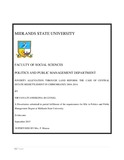Please use this identifier to cite or link to this item:
https://cris.library.msu.ac.zw//handle/11408/2625| Title: | Poverty alleviation through land reform: the case of Central Estate ressettlement in Chirumhanzu 2004-2014 | Authors: | Zvandikona, Nirvana | Keywords: | Poverty alleviation Land reform Central Estates Ressettlement |
Issue Date: | 2015 | Publisher: | Midlands State University | Abstract: | This study was aimed at finding out whether land resettlement indeed achieved poverty eradication, using the case of Central Estate Resettlement in Chirumhanzu, to ascertain whether or not resettled farmers in Central Estate in Chirumhanzu have managed to eradicate poverty through accessing land and produce cash crops. A couple of literature on sustainable livelihoods, including relevant model, was reviewed focusing on aspects such as community assets, adaptive strategies and technologies contributing to livelihood systems, and the analysis of cross-sectorial policies and investment requirements to enhance livelihoods. A sample of 60 respondents were randomly selected, comprising respondents from village households who were given questionnaires to complete. Harvests were generally low with only 12 respondents (20%) indicated that they attain an average of the 900 kg of cotton harvest per hectare in the three years, and that only 5 respondent households (8.3%) indicated that they had more than 5 herd of cattle. One of the main conclusion was that agricultural inputs are not readily available and affordable to FTLRP beneficiaries and this constrains farmer’s potential to achieve huge harvest due to inadequate availability of inputs. Also other environmental factors like low rainfalls, droughts and land degradation were minimizing farmers’ potential to gain more mileage in alleviating poverty through land, hence the need to adopt more scientific methods to farming. However, this would need more capital and with the prevailing strained economic environment in Zimbabwe, it would take more time to realize poverty eradication in its whole. Among other things, the study recommended that the government should urgently address crop and livestock productivity through enacting policies that focus on sustainable availability and accessibility of inputs to resettled farmers. However, it is noteworthy that poverty alleviation through land is very crucial as it is the most means of production provides a key to sustainable livelihoods in Zimbabwe, if implementation is effective, efficient, accountable and transparent. On a general note upon reflection of Zimbabwe’s history whereby the indigenous people were subjugated by white minority, government’s initiative to empower its citizens through land is a progressive step to realize poverty reduction as it assists the citizens to be self-dependent and succumb social and economic hardships. | URI: | http://hdl.handle.net/11408/2625 |
| Appears in Collections: | Bachelor Of Science In Politics And Public Management Honours Degree |
Files in This Item:
| File | Description | Size | Format | |
|---|---|---|---|---|
| FINAL 1.pdf | Full text | 1.11 MB | Adobe PDF |  View/Open |
Page view(s)
10
checked on Aug 30, 2024
Download(s)
36
checked on Aug 30, 2024
Google ScholarTM
Check
Items in MSUIR are protected by copyright, with all rights reserved, unless otherwise indicated.


